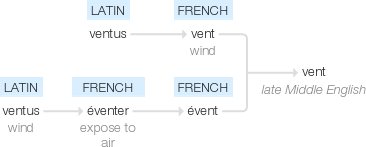Vent
late Middle English: partly from French vent ‘wind’, from Latin ventus, reinforced by French évent, from éventer ‘expose to air’, based on Latin ventus ‘wind’.
wiktionary
Partly from Middle French vent, from Latin ventus and partly from French éventer. Cognate with French vent and Spanish viento(“wind”) and ventana(“window”). Doublet of wind.
Clipping of ventriloquism
From French vente, from Latin vendere(“to sell”).
From Spanish venta(“a poor inn, sale, market”).
Clipping.
etymonline
vent (v.)
late 14c., "emit from a confined space," probably a shortening of aventer "expose oneself to the air" (c. 1300), from Old French eventer "let out, expose to air," from Vulgar Latin *exventare, from Latin ex "out" + ventus "wind" (from PIE *wē-nt-o‑ "blowing," suffixed (participial) form of root *we- "to blow").
Sense of "express freely" first recorded 1590s. Sense of "divulge, publish" (1590s) is behind phrase vent one's spleen (see spleen). Related: Vented; venting.
vent (n.)
c. 1400, "anus," from Old French vent from verb eventer (see vent (v.)) and in part from Middle English aventer, from the French verb. Perhaps also merged with or influenced by Middle English fent "opening or slit in a the front of a garment (usually held closed with a brooch)," c. 1400, from Old French fente, from Latin findere "to split" (from PIE root *bheid- "to split"). Meaning "outlet for water," also "air hole, breathing hole" is from mid-15c. Meaning "action of venting" is recorded from c. 1500.
